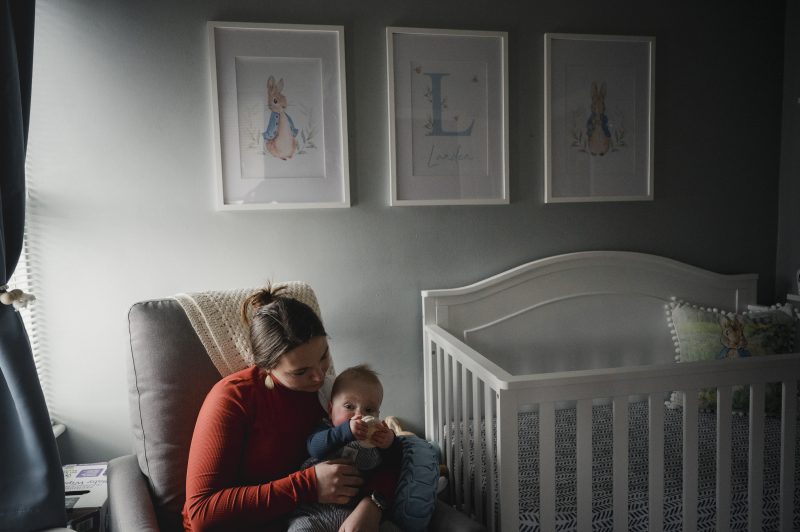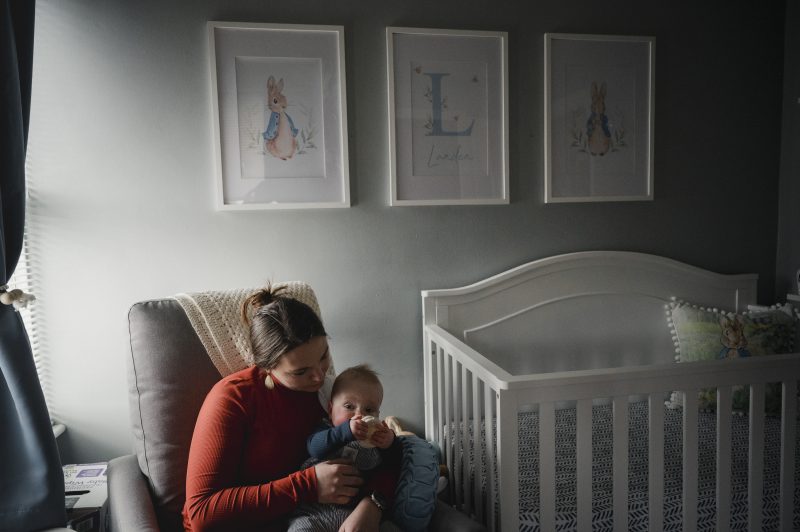
CAMP HILL, Pa. — Rep. Scott Perry, a conservative Republican representing a moderate suburban district in the Harrisburg area, insists he supports in vitro fertilization though he sponsored a bill last year that would make it federal law that life begins at conception.
But some voters in his district, like new mom Ashley Moyer, don’t believe him.
“I don’t really know how you can support IVF and believe that life begins at conception,” Moyer said. “The two things are very contradictory.”
Moyer, 32, who conceived her 9-month-old baby boy through IVF, voted for Donald Trump in 2016. But she said she’s been energized by conservative attacks on reproductive rights in the last several years. Now, she said she doubts she would ever vote for a Republican again — especially not Perry.
As Democrats pursue opportunities to flip the three seats they would need to win back the House majority in November, they hope anger over a ruling Feb. 16 by the Alabama Supreme Court that frozen embryos are people will give them new momentum in swing districts. They believe the IVF debate could particularly help them target Republicans in vulnerable districts like Perry, who have backed policies that could threaten the popular fertility treatment.
Democrats plan to campaign aggressively on the issue, hoping to capitalize on the electoral successes they had after the Supreme Court overturned Roe v. Wade in 2022. The House Majority PAC, a super PAC dedicated to electing Democrats to the House, has identified nine incumbent Republicans, including Perry, in competitive districts who co-sponsored the Life at Conception Act, which says the right to life begins at “the moment of fertilization.”
Democrats also highlighted the IVF issue at Thursday’s State of the Union, with President Biden bringing as a guest an Alabama mother who had her IVF procedure canceled after the state Supreme Court ruling and citing the ruling in his remarks. “My God, what freedoms will you take away next?” he asked Republicans during the speech.
The Alabama court decision led several providers in the state to halt IVF treatments and terrified women all over the country like Moyer, who relied on the medical procedure to start a family. Facing a national backlash, Alabama Republicans last week passed a measure protecting patients and doctors from legal liability if frozen embryos created in IVF treatments are destroyed or damaged.
The IVF debate has likewise thrust lawmakers like Perry, who is an original co-sponsor of legislation that would enshrine in federal law that human life begins at conception, into vulnerable political terrain as he faces an already challenging reelection in a moderate district.
Not long after the Alabama ruling, Perry swiftly sought to clarify his position. “I support IVF – it provides hope to so many loving families struggling to conceive,” Perry posted on X.
A campaign spokesman did not respond to a question about whether his belief that life begins at conception includes embryos created for IVF or whether he would vote for legislation to create federal protections for IVF. The spokesman instead sent a statement via email from Perry that reiterated his support for IVF.
Two-thirds of Americans said they do not believe that frozen embryos are people, as the Alabama court held, or that those who destroy them should be held legally responsible, according to a recent Axios/Ipsos poll. Unused embryos created during IVF are often discarded.
That includes voters like Moyer. As she bounced her son, Landen, on her lap in late February, her eyes filled with tears as she described her own IVF experience. Her husband had cancer as a child and could not reproduce. To birth her own baby she had to go through fertility treatments.
Moyer was self-administering her first hormone injections on the day Roe was overturned. As she navigated her own reproductive health, Moyer was stunned to see access to abortion, which she believed was a “fundamental right,” be reversed. Moyer, who moved to the district in 2020, had always voted but never considered herself an activist. Suddenly, she began attending marches in Washington, writing letters to legislators and sharing her fertility story on social media.
Perry, a former combat veteran now in his 12th year in Congress, won his south central Pennsylvania seat by 32 percentage points in 2016. He has managed to win reelection even after the Pennsylvania Supreme Court redrew his once solidly Republican district to include more Democratic areas, such as Harrisburg and York in 2018.
The district still retained enough of its rural heartland to tilt Republican. In 2022, after Roe was overturned, Perry won reelection by close to 8 percentage points, winning even as Democrat Josh Shapiro beat his far-right Republican opponent for governor, state Sen. Doug Mastriano, in the district by 12 points.
Democrats view Shapiro’s success in a campaign where abortion was also a key issue as evidence that they can win the seat with a strong candidate who can frame Perry as an extremist threat, much as Shapiro did with Mastriano.
Perry, in addition to his staunch antiabortion views, was intimately involved in efforts to overturn the 2020 presidential election, echoing the baseless claims that widespread voter fraud cost Trump reelection. Perry also objected to Congress counting Pennsylvania’s electoral votes for President Biden.
Republican and Democratic strategists agree Perry remains formidable.
“Scott Perry is always in trouble and he always wins handily,” said Charlie Gerow, a veteran GOP consultant in Harrisburg.
T.J. Rooney, a longtime Democratic strategist and former chairman of the state Democratic Party, also thinks Perry will be hard to beat, calling him Democrats’ “fool’s gold” who has beaten back strong opponents before. But, he added, Perry may get dragged by having Trump, unpopular among suburban voters, at the top of the ticket.
A half dozen Democrats are competing in Pennsylvania’s April 23 primary for the chance to take on Perry. Nationally, Democratic strategists are most optimistic about Janelle Stelson, a local television news reporter for more than three decades, who they believe will appeal to the district’s moderate, suburban women.
Stelson has earned the endorsements of Emily’s List, a political organization that works to elect Democratic women, and the New Democrat Coalition, a center-left group of Democratic members of Congress. In December, the nonpartisan Cook Political Report, which tracks swing congressional districts, moved its assessment of the race as being one that would “likely” be won by a Republican to a “lean” Republican district, citing Stelson as a serious challenger.
Sitting in a local coffee shop, Stelson said she left journalism to challenge Perry because she “would never be able to forgive myself for not trying to take him down.”
“He is the most extreme MAGA member of Congress who is vulnerable,” Stelson said. “I can’t tell you how many Republicans and independents I’ve had coming up to me that said, ‘You take him down.’ And usually using saltier language.”
Stelson is hoping to appeal to women like Lindsay Koch, a lifelong Republican who voted for Trump twice and for Perry, but has grown increasingly turned off by the GOP’s attacks on reproductive rights and its other culture wars. She ran for school board as a Republican last year, but said she was horrified when the state party sent out a mailer with her picture on it that accused her Democratic opponents of promoting books that sexualize children. The day after she lost that election, she changed her party registration to independent.
Koch, 37, a mother of three young children and professor of early and special education at Lebanon Valley College, said this year she will vote for Democratic candidates for president and Congress for the first time.
“I have siblings who have undergone fertility treatments. I’ve undergone fertility treatments. I have family members who are gay and have beautiful lives,” Koch said. “It’s difficult for me to associate myself with a party that would find anything wrong with that.”
Koch’s neighbor, Christine Maugle, is similarly appalled by the attacks on reproductive rights. Maugle, who voted for Trump in 2016 but then Biden in 2020, said until the last several years issues such as abortion didn’t influence her voting, because she thought, “We’re good. Women have established our rights.”
Maugle, 38, said she will be thinking about her two daughters potentially losing their rights when she votes against Perry in November.
“The IVF thing is really disturbing on so many levels,” Maugle said. “It’s so hard to believe it’s 2024 and we’re having this legit discussion about it.”

